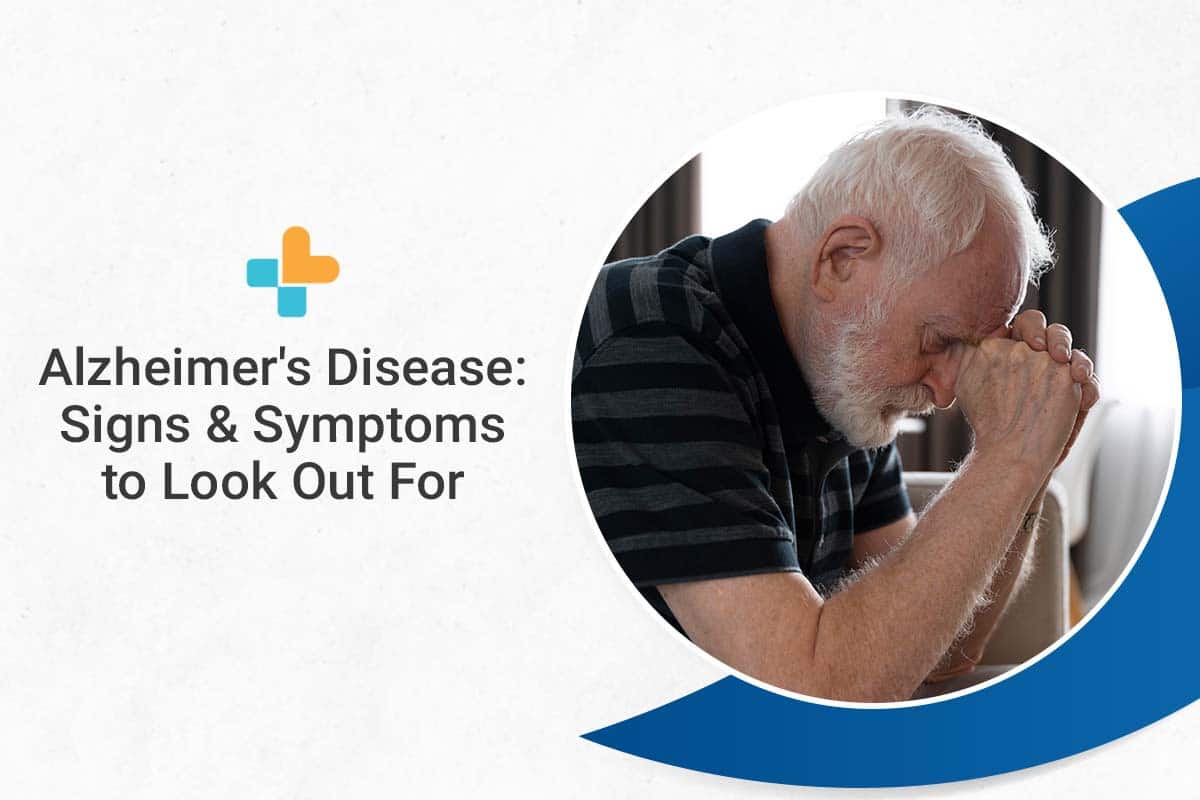As heartbreaking as Alzheimer’s is for family members, it is more terrifying for the person who has started showing signs and symptoms. A common misconception is that this is a disease that comes with age. But the damage that Alzheimer’s causes to the brain start a decade or more before signs of memory loss and cognitive decline appear.
Although there is no cure for Alzheimer’s disease, early detection can help slow down the cognitive and functional decline. Hence, it is important for people to be as aware as possible, especially those who are at risk for developing Alzheimer’s.
Before we get into Alzheimer symptoms and stages, let’s have a brief understanding of what Alzheimer’s disease is and what it does to the brain.
What is Alzheimer’s Disease?
Alzheimer’s disease (AD) is a progressive disorder where atrophy (shrinking of the brain) occurs and nerve cells in the brain stop working. As a result, the brain signals fail to function properly causing memory, thinking, and reasoning skills to deteriorate gradually.
The exact causes of Alzheimer’s disease are unknown, but there are multiple risk factors like genetics, down syndrome, head trauma, etc., linked to it.
Changes in the brain (shrinking) occur 10 to 20 years before noticeable symptoms develop in persons with Alzheimer’s disease. Since atrophy (shrinking of the brain) cannot be diagnosed without looking into the living brain, Dr. Barry Reisberg of New York University created the Functional Assessment Staging Test (FAST) to help identify the signs and symptoms.

FAST is an Alzheimer test that helps classify Alzheimer’s disease into three stages based on symptoms and behaviour. Doctors, medical professionals, and family members can use this scale to better understand, discuss, and track the progression of Alzheimer’s disease.
The Three Stages of Alzheimer’s and its symptoms
Mild, moderate, and severe are the three stages of AD. Each stage comes with its own set of signs and symptoms.
Mild Alzheimer’s Disease
Duration- (lasts from 2-4 years)
Although a person with mild Alzheimer’s disease appears to be in good health, they may begin to have difficulty understanding things going on around them. This confusion may appear typical at first but is more so to a person with AD. Symptoms of the mild stage include:
- Difficulty learning and remembering new information
- Having trouble managing finances, planning meals, and taking medications on time
- Depression symptoms like mood swings and behaviour changes
- Loss of recent memories, such as forgetting recent conversations and occurrences
Moderate Alzheimer’s Disease
Duration- (lasts from 2-10 years)
In this stage, the damage has extended to a broader area of the brain. The parts of the brain that control language, reasoning, sensory processing, and cognition are now affected by the disease. The signs and symptoms here are more prominent and noticeable.
- Getting irritated more easily over unimportant, seemingly insignificant incidents
- Starting to continually repeat stories and/or asking the same questions over and over
- Starting to get paranoid, delusional and/or hallucinating
- Neglecting appearance, cleanliness, and sleep; becomes increasingly apparent
- Experiencing sundown syndrome ( disorientation that begins in the late afternoon and lasts into the evening; includes confusion, anxiety, anger, and misbehaviour)
Severe Alzheimer’s Disease
Duration-(lasts from 1-3 years)
It is also referred to as late Alzheimer’s. At this stage, the damage to the brain’s nerve cells has become widespread. For family and caregivers, this is an even more challenging stage. Some of the signs and symptoms include:
- Failure to recognize family or faces
- Difficulty performing day-to-day activities
- Inability to communicate
- Trouble moving easily on their own
- Difficulty swallowing and controlling their bladder and bowels
- Loss of speech
If you or someone you know is experiencing mild symptoms with risk factors, it’s always a good idea to see a doctor as soon as possible. It might not always be Alzheimer’s. Memory problems can also be caused by depression, stress, medicines or other health problems.
A good psychiatrist can help you find out the true cause by running simple tests. Our experts atAyu Health have a lot of experience and will provide you with the best course of action to slow down the progression of the disease and its effects. Visit our website to book an appointment or call us at +91 08069489584 for a consultation.
If you need additional resources or would like to speak with a professional, feel free to contact us right away at +91 636-610-0800 or book an appointment on our website. Our expert team is here to assist and support you every step of the way.
Our Hospital Locations
General Surgery Hospitals in Chandigarh | General Surgery Hospitals in Bangalore | General Surgery Hospitals in Jaipur | General Surgery Hospitals in NCR | General Surgery Hospitals in Hyderabad
Our Doctors
General Surgery Doctors in Chandigarh | General Surgery Doctors in Bangalore | General Surgery Doctors in Jaipur | General Surgery Doctors in NCR | General Surgery Doctors in Hyderabad
About the Author

Dr. Karthikeyan Y R
Dr. Karthikeyan Y R is a renowned NeuroSurgeon currently practicing at Ayu Health, Bangalore.
He is a proficient Neurosurgeon having 16 years in this field. He is a member of the Karnataka Medical Council. He has his expertise in Brain Aneurysm Coiling, CSF Rhinorrhoea Repair Surgery, Peripheral Neurosurgery, Carotid Cavernous Fistula Treatment, and Pediatric Neurosurgery.




